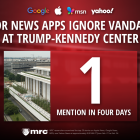
Matt Stoller, author of the bestselling book Goliath: The 100 -Year War Between Monopoly Power and Democracy, celebrated how a “shocking opinion” from the Third Circuit signaled “Big Tech's Free Ride” was ending. At the same time, Stoller warned that the court was wrong to treat Big Tech oligarchs as “speakers.”
The Third Circuit decision in Anderson v. TikTok held 47 U.S.C. § 230, or Sec. 230, does not apply to the algorithms tech firms use to determine what content is curated to users. Previous courts had held that Sec. 230 presented a broad “liability shield” for both what content a platform recommends and what content it censors.
Stoller explained that “at the very least, this decision forces the issue” of what Sec. 230 actually means. The Supreme Court has yet to issue a ruling interpreting the meaning of the legislative provision, even though it was enacted 28 years ago.
Stoller cautioned, though, that rather than completely remove algorithms from Sec. 230’s protections, courts should instead view tech firms as distributors. This interpretation, Stoller explained, would recognize “an older pre-internet legal distinction between ‘publisher’ liability for speech, which is to say that author or publisher’s responsibility, and ‘distributor’ liability for speech, which is to say the bookstore, library, or newsstand’s role.”
Stoller noted that this was the position taken by Judge Paul Matey, an appointee of then-President Donald Trump, who sought to interpret the statute according to its original meaning.
Stoller explained, “the fundamental issue here is not really whether big tech platforms should be regulated as speakers, as that’s a misconception of what they do. They don’t speak, they are middlemen. And hopefully, we will follow the logic of Matey’s opinion, and start to see the policy problem as what to do about that.”
MRC Free Speech America Director Michael Morris elaborated, “Under Sec. 230, a platform should be treated as a distributor unless or until it goes beyond the enumerated list of acceptable justifications and begins censoring content. If it does go beyond this enumerated list, it then becomes a publisher.”
The Anderson ruling comes in ongoing litigation against the Big Tech firm TikTok and its parent company, communist Chinese government-controlled Bytedance. The suit was brought by the mother of a ten-year-old who died attempting the so-called “Blackout Challenge.”
This challenge, which TikTok promoted to the girl in its “For You Page,” encouraged viewers to intentionally asphyxiate themselves. Meanwhile, MRC Free Speech America’s CensorTrack database has documented 164 cases of TikTok censoring constitutionally-protected speech.
Conservatives are under attack. Contact your representatives and demand they reiterate Sec. 230’s original meaning: When Big Tech censors political expression, they become publishers.









